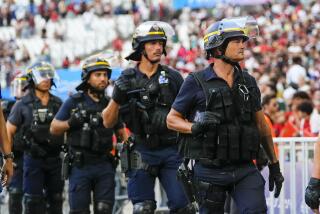German Court Finds Algerians Conspirators
BERLIN — Four Algerians believed to belong to an Al Qaeda-linked terrorist cell were found guilty in a German court Monday of conspiracy to commit murder in a foiled plot to blow up a French Christmas market and cathedral in December 2000.
The four men were handed prison sentences ranging from 10 to 12 years, capping a closely watched case that investigators considered important to understanding the workings of Al Qaeda throughout Europe.
At the same time, the case demonstrated the difficulty authorities have faced in making charges of terrorist membership stand up in court, hindered as they are by laws drawn up in a pre-Sept. 11 world and by Europe’s patchwork of justice systems.
Prosecutors in the west-central German city of Frankfurt, where the four Algerians were tried, decided in January to drop charges alleging that the men were members of a North African terrorist organization with ties to Al Qaeda, even though ample evidence connected them to Al Qaeda operatives from Britain to Spain to Italy, intelligence officials say.
Instead, the men were convicted only of conspiracy and of preparing to carry out a bombing in the French city of Strasbourg, on the border with Germany, on New Year’s Eve 2000.
Investigators say those preparations were the closest any Al Qaeda-linked group has come to mounting a successful attack on European soil.
The prosecution has not elaborated on its decision to abandon the terrorist charges. But criminal experts say it would have been hard for prosecutors to meet a standard of proof above mere guilt by association, especially with a group as decentralized and loosely organized as Al Qaeda.
“You must show that someone participated with knowledge and intent,” said Bernd-Ruedeger Sonnen, a professor of criminal law at the University of Hamburg in northern Germany. “In practice, it’s very difficult to prove.”
The defendants -- Aeurobui Beandalis, Salim Boukari, Lamine Maroni and Fouhad Sabour -- were committed Islamic militants who admitted to training at terrorist camps in Afghanistan. But they denied ties to Al Qaeda and claimed that their goal was to fight the Algerian government, which has been warring for years with militant factions bent on establishing a fundamentalist Islamic regime.
Three of the men did confess to plotting an attack on a Strasbourg synagogue, but Boukari and Sabour said they expected the temple to be empty and had not intended to harm anyone.
The judges in the case rejected the men’s arguments as “absurd.” Instead, they cited evidence seized from the men’s apartment, including detonators and incendiary chemicals, notes on how to make bombs and a chilling videotape of the town square where the Christmas market was held.
On the tape, which the men narrated as the camera panned over the brightly lighted plaza, a voice can be heard saying, “These are the enemies of God.”
Delivering the verdict, the head judge, Karlheinz Zeiher, accused the defendants of engaging in a “holy war” against the West and of purposely choosing targets symbolic of Christianity: the bustling Christmas market and the nearby Notre Dame cathedral, a soaring Gothic edifice.
Had it succeeded, the attack would have been “a horrific blood bath ... that could have hit anyone, including unsuspecting, defenseless people,” Zeiher said. The men “wanted to hit the nerve center of a free, Western, civilized society.”
Germany’s top security official, Interior Minister Otto Schily, told reporters that the prison sentences would make other would-be terrorists think twice.
“For planning such a heinous crime, only the harshest of punishments can be the correct one,” he said. “The judgment proves that in Germany, the fight against terrorism is effective and successful.”
Yet in many ways, the 11-month-long trial focused attention on an opposite picture: of Germany as a nest of terrorist cells that found it easy to set up operations under comparatively loose immigration laws and weak counter-terrorist policing.
The central cell that plotted the Sept. 11 attacks, for example, was based in Hamburg. And some European law-enforcement officials say that the men who were sentenced Monday deliberately based themselves in Frankfurt, across the border from their intended target of Strasbourg, to take advantage of Germany’s more lax system.
Sonnen, the criminal law scholar, said that belonging to a terrorist group has been a punishable offense in Germany since the 1970s, the convulsive period of radical leftist groups like the Baader-Meinhof guerrilla organization.
“But it happened very seldom that someone who was accused was convicted,” because the standard of proof was fairly high, he said.
Germany has toughened its legislation since the Sept. 11 attacks and granted greater powers to police to tap phones and take other measures to root out terrorism, but membership in as amorphous an organization as Al Qaeda remains difficult to prove, let alone punish.
Still, the arrest of the Frankfurt cell on Christmas Day 2000 -- just days before its planned attack in Strasbourg and nearly nine months before New York and the Pentagon were hit -- added pieces to the puzzle of how Al Qaeda functions in Europe.
Officials describe an operation increasingly driven by know-how from the Middle East but powered by foot soldiers recruited from North African countries such as Algeria and Tunisia.
The Frankfurt cell was headed by Mohammed Bensakhria, whose alias, “Meliani,” gave the group its name.
Investigators in France, Britain, Italy, Spain and Belgium say phone intercepts, documents and other evidence revealed extensive contact between the Meliani group and suspected Al Qaeda operatives, including Abu Qatada and Abu Doha, two top figures now sitting in jail in London.
Abu Qatada is believed to be Al Qaeda’s ranking cleric in Europe, and Abu Doha, an Algerian, was the alleged mastermind behind a plot to bomb LAX on the eve of millennium celebrations in 1999.
The day before the Meliani conspirators were arrested, British intelligence picked up a phone conversation between Abu Doha and someone in Germany in which the two discussed “a project for a terrorist attack that would take place around New Year’s Eve,” according to a 2001 Italian judicial report.
Bensakhria is believed to have fled Germany before the Strasbourg plot was foiled. He was captured in Spain in June 2001 and extradited to France, where he awaits trial on charges of being affiliated with Al Qaeda.
Times staff writer Sebastian Rotella in Paris contributed to this report.
More to Read
Sign up for Essential California
The most important California stories and recommendations in your inbox every morning.
You may occasionally receive promotional content from the Los Angeles Times.











